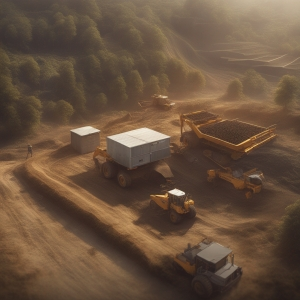Table of Contents:
Introduction: Understanding Bitcoin Mining
Bitcoin Mining is an integral part of the blockchain technology that fuels the operation of Bitcoin. It offers the dual function of generating fresh bitcoins and verifying transactions for their accuracy and security. However, a significant aspect of this process that often goes unnoticed is its environmental impact. This article aims to shed light on the 'Environmental Impact of Bitcoin Mining', demystifying its complexities, while also providing readers with key insights into this hot-button issue.
The process of Bitcoin mining involves the use of high-end computer systems, performing complex mathematical problems to enable transaction verification and the generation of new bitcoin tokens. As you'd assume, this process requires a massive amount of energy, and thereby, bridges our discussion to its implications on the environment.
Get $500 free Bitcoin mining for a free testing phase:
- Real daily rewards
- 1 full month of testing
- No strings attached
If you choose to buy after testing, you can keep your mining rewards and receive up to 20% bonus on top.
We'll guide you through this process, helping you understand the nuts and bolts of it all, and by shedding light on how exactly it affects the environment. Whether you are a crypto enthusiast or a beginner in the financial realm, understanding the environmental impact of Bitcoin mining is essential as we move further into the realms of digital currencies.
The Process of Bitcoin Mining and its Impact
Bitcoin mining relies heavily on electricity to power the extensive computational work required. High-powered machinery operates continuously to solve complex mathematical problems, a process that confirms transactions and adds them to the blockchain. But what's the catch?
Well, the catch here is the tremendous amount of electricity these machines consume. This high energy consumption escalates climatic concerns as the majority of the world's electricity is still not from renewable sources. Consequently, the process contributes to the misuse of resources and adds to the overall greenhouse emissions, causing a ripple effect on the environment.
A further issue stemming from the mining process is electrical waste. Mining equipment has a limited lifespan and thus contributes to the growing e-waste problem. Bitcoin miners often find themselves in the position of having to constantly update their hardware to remain competitive, leading to an accelerated rate of electronic waste generation
It's easy to be enticed by the financial prospects of bitcoin but understanding these environmental repercussions provides a more holistic view of this groundbreaking technology.
Pros and Cons of Bitcoin Mining's Environmental Impact
| Pros | Cons |
|---|---|
| Promotes renewable energy through the need for cheap electricity | High energy consumption which may lead to increased greenhouse gas emissions |
| May stimulate innovation in energy-efficient technologies | Concentration in regions with coal-based power can exacerbate carbon footprint |
| Decentralization of mining can lead to energy distribution | Electronic waste from obsolete mining equipment |
| Potential driver for the development of cheap and renewable energy projects worldwide | Current uses more electricity than some countries, inducing pressure on electrical grids |
The Energy Consumption of Bitcoin Mining

The energy consumption in Bitcoin mining is indeed staggering. Powerful computers, known as miners, work round the clock, undertaking billions of calculations per second to keep the Bitcoin network secure. This level of computational effort requires an immense amount of energy.
Though the exact energy consumption can vary, recent estimates suggest that the Bitcoin network consumes more electricity annually than some countries. This understandably raises concerns about the sustainability of such an energy-intensive process in an era where energy conservation is crucial.
It is also important to highlight that not all energy consumption is created equal. While some mining farms are powered by renewable energy sources, a majority still rely on traditional fossil fuels. This means that as well as being energy-intensive, Bitcoin mining plays its part in carbon emissions, further exacerbating the climate crisis.
These are the hard truths of Bitcoin mining's energy consumption that every prospective miner and investor should bear in mind.
Bitcoin Mining and Carbon Footprint
Bitcoin mining's energy profile has a direct implication on its carbon footprint. Given the intensive use of electricity, much of which is derived from fossil fuels, it contributes significantly to global carbon emissions. Coal-powered electricity is a common feature in several countries, and it directly adds to the carbon footprint of Bitcoin mining in these regions.
A study reveals that Bitcoin's CO2 footprint is comparable to that of some big cities or even entire countries. These emissions come from the miners' energy use and the manufacturing process of mining equipment. So, while the financial return of mining is very enticing, the environmental cost associated with it can't be gratified.
Reckless energy use is not sustainable, and for the crytocurrency industry, this could mean huge roadblocks down the line. A drastic shift towards renewable energy sources for mining operations is one potential solution reiterating the importance of sustainability in all aspects of tech industry.
It is also essential for investors and consumers to consider these environmental impacts when deciding to invest in or use Bitcoin or any other high energy-demanding cryptocurrency.
Sustainable Solutions for Bitcoin Mining

While the environmental impact of Bitcoin mining is undeniable, there are some sustainable solutions in development that aim to address these issues. As the concerns mount over the energy consumption and carbon emissions related to Bitcoin mining, the crypto industry is responding with more sustainable approaches.
One solution is shifting towards renewable energy sources for Bitcoin mining operations. Solar and wind energy are becoming increasingly cheaper and more efficient, making it a viable option for miners. Additionally, some miners are finding ingenious ways to use excess energy from other operations or harnessing power in off-peak times when there is surplus electricity in the grid.
Another answer may lie in the technology itself. Advancements in mining hardware result in more energy-efficient equipment that can help reduce the environmental impact. Coupled with blockchain innovations aimed at reducing computation power without compromising security, the future of Bitcoin mining could look a lot more sustainable.
Lastly, carbon offsetting – a way of neutralizing carbon emissions by investing in projects that reduce future emissions – could provide another pathway for miners to help mitigate the environmental impact of their operations.
Undoubtedly, the road to sustainable Bitcoin mining is a challenging one. However, if the crypto industry can successfully navigate these hurdles and find balance, the future of digital currencies looks promising with respect to the environment.
Conclusion: Balancing Bitcoin Mining and Environmental Concerns
Striking a balance between the promising innovations of Bitcoin mining and its environmental impact is a task that requires immediate attention. A digital currency with such groundbreaking potential should not be at odds with our sustainability goals. The Bitcoin network and miners must therefore place an ever-increasing emphasis on deriving their energy from renewable sources and investigating more eco-friendly mining methods.
The advent of more energy-efficient hardware and algorithms, coupled with a greater emphasis on renewable energy sources, is the first step towards a more sustainable mining process. Awareness and transparency around the environmental impact of Bitcoin mining will also be a crucial driver in pushing towards greener practices.
In conclusion, understanding the environmental impact of Bitcoin mining is as significant as understanding the technology itself and its financial implications. As investors, miners, and general enthusiasts, it’s pivotal to keep the larger, global picture in mind, particularly when our actions have consequences extending far beyond the realm of finance. The road to sustainable Bitcoin mining might be uphill, but it is one that we must undertake, for the sake of both the environment and the future of digital currencies.
Understanding the Environmental Impact of Bitcoin Mining

What is Bitcoin's environmental impact?
The process of Bitcoin mining requires a significant amount of electrical energy, which can contribute to carbon emissions depending on the source of this electricity.
How does Bitcoin mining contribute to climate change?
Bitcoin mining often relies on electricity generated from fossil fuels, particularly coal. This contributes to greenhouse gas emissions and global warming.
Are there more eco-friendly options to mine Bitcoin?
Yes, some initiatives are exploring renewable energy sources for Bitcoin mining. However, the overall environmental impact is still significant.
What can be done to reduce the environmental impact of Bitcoin mining?
Measures could involve more efficient mining equipment, transition to renewable energy, or changes in the bitcoin protocol to reduce energy consumption.
Can energy consumption for Bitcoin mining become unsustainable?
There is a debate on this issue. Some experts believe that if Bitcoin's energy consumption continues to rise at its current rate, it could become unsustainable. Others argue that technological advancements and renewable energy could mitigate these concerns.






